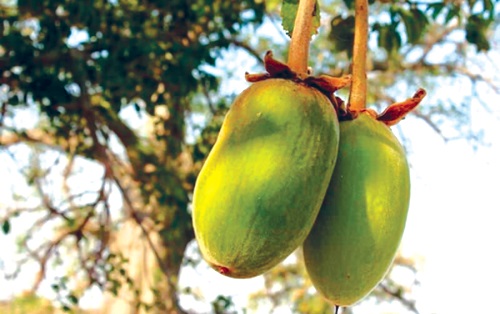Baobab is a tree native to certain regions of Africa, Arabia, Australia and Madagascar. Adansonia is the scientific name and it can grow up to 98 feet (30 metres) tall and produce a large fruit that is commonly consumed and appreciated for its delicious citrus-like flavour.
Scientific benefits
The US Department of Agriculture notes that two tablespoons (20 grams) of powdered baobab can give you: calories: 50grammes; protein: one gramme; carbs: 16 grammes; fat: zero grammes; fibre: nine grammes; vitamin C: 58 per cent of the Reference Daily Intake (RDI); vitamin B6: 24 per cent of the RDI; Niacin: 20 per cent of the RDI; Iron: nine per cent of the RDI; Potassium: nine per cent of the RDI; Magnesium: eight per cent of the RDI; Calcium: seven per cent of RDI.
From the review, powdered baobab and fresh parts of the plant are extremely nourishing.
Supporting literature: Weight loss
One study by Garvey et al., (2017) used 20 people and found that drinking a smoothie with 15 grams of baobab extract drastically decreased feelings of hunger compared to a placebo drink.
One randomised controlled trial found that the fibre content in baobab goes through the stomach slowly and then keeps the stomach at bay and makes one feel satiated for a longer time (Yu et al., 2014).
A previous review (Howarth et al., 2001) found that the more fibre we eat by 14 grams per day reduced calorie intake by up to 10 per cent and decreased body weight by an average of 4.2 pounds (1.9 kg) more than a four-month duration.
Another randomised controlled trial by Coe et al., (2013) found that baking baobab extracts into white bread decreased the amount of rapidly-digested starch and slowed down the increase of blood sugar levels in the body.
Another human trial used 13 people and found that when we add baobab to white bread, it reduced the amount of insulin required to convey sugar from the blood to the tissues to help control blood sugar levels (Coe and Ryan, 2016).
Meanwhile, a previous study (Lattimer and Haub, 2010) found that due to the high fibre content, baobab could slow the absorption of sugar into the bloodstream. This could avert spikes and bangs in blood sugar and stabilise levels for a long time.
Digestive Health
Three studies (Satoh H, 2010; Pituch-Zdanowska et al., 2015; Alonso-Coello et al. 2006) found that the more we consume fibre in baobab, the more protection we could gain against conditions like intestinal ulcers, inflammatory bowel disease and haemorrhoids.
Finally, a study by S. Manfredini, (2002) found that its effectiveness as a prebiotic has been proven both in research and its traditional use in Africa. Italian researchers have discovered that baobab fruit powder has a positive prebiotic effect on key groups of probiotic gut flora.
Compared to controls, they found that baobab fruit powder promoted significant increases in the production of two of the three key bacterial groups; Bifidobacteria and Lactobacilli.
Adaptogens
Baobab fruit powder is known to help boost the immune system. Baobab has an extremely high antioxidant profile. Antioxidants are substances that may protect cells in your body from free radical damage that can occur from exposure to certain chemicals, smoking, pollution, radiation and as a byproduct of normal metabolism.
Dietary antioxidants include selenium, vitamin A and related carotenoids, vitamins C and E, plus various phytochemicals such as lycopene, lutein and quercetin. Consuming foods rich in antioxidants may be good for your heart health and may also help to lower your risk of infections and some forms of cancer.
With six times more vitamin C than oranges, Baobab Fruit Powder is a rich source. Vitamin C (ascorbic acid) is a water-soluble vitamin. We can’t store it in the body, which means we need it from our diet every day. Vitamin C helps protect cells and keeps them healthy. It is also involved in the production of collagen, which is important for the support and structure of all connective tissues in the body. It can help with wound healing. It increases our ability to absorb Iron. And, of course, vitamin C is one of many antioxidants that may protect against free radical damage.
Baobab has double the iron of spinach. Iron has a role in creating energy from nutrients. It also contributes to the transmission of nerve impulses — the signals that coordinate the actions of different parts of your body. If you have more iron than is needed, it’s stored in your body for future use.
Without healthy levels of iron, your red blood cells cannot effectively provide oxygen to your cells and tissues. Symptoms of anaemia include fatigue, weakness, dizziness and difficulty concentrating.
The writer is the President, of Nyarkotey College of Holistic Medicine & Technology (NUCHMT)/African Naturopathic Foundation.
He adheres to strict sourcing, studies and academic papers in his articles, which are for educational purposes only and not medical advice for treatment.
E-mail: collegeofholisticmedicine@gmail.com.



Leave feedback about this